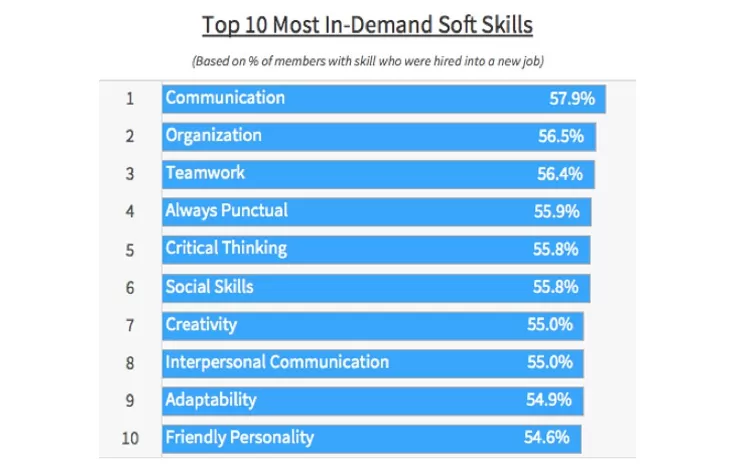Have you noticed? A lot of people in the industry are talking about soft skills these days. So first let’s start with the definition. Soft skills are non-professional skills that are not related to the official duties of a person. Teamwork – that’s the very word to understand what I’m talking about. By the way, do you know what the possible transcript for “team” is? T – together, E – everyone, A – achieves, M – more. According to the survey by LinkedIn, here’s the list of soft skills employers want the most from their (potential) employees:

The chart illustrates a widespread misconception between the concepts of “soft skills” and “communication”. The rumour has it: if an employee knows how to choose words to make complete sentences, his soft skills are more or less okay. This is a very superficial point of view. As becomes evident by looking at the chart above, the process of communication (despite being the most important) is just one of the skills. At the same time, the same survey claims that 59% of hiring managers in the USA consider soft skills difficult to find which leads us to the next question below.
What soft skills do software engineers need?
Or, perhaps, do they need all these skills at all? Any developer would agree: the primary responsibility of an engineer is to write code, and his main interlocutor is a computer. It’s partially true, but at least they all have to communicate with other team members and do it effectively. Nowadays, the vast majority of programs are created in teams. To make a successful and profitable product on your own is really hard. Again, one can sacrifice your talent, time and energy to become a superman with lots of skills, but come on – the work with like-minded people will bring much more dividends. So again – do you remember the acronym for “team”?
It’s difficult to be a good listener without being capable of developing interpersonal skills: the ability to ask questions, listen to and hear one another. Don’t even try to make yourself believe that soft skills are optional, and you can compensate its lack with your professional abilities. In reality, they are vital for both employers and employees. Soft skills matter for everyone in a company: engineers, QAs, project managers, sales managers, you name it. If one wants to reach the next level in career, soft skills are an integral part of the journey.
Besides, they are all about performance, and they draw a line between an average and high performer. Accordingly, this paradigm affects the organization as a whole.

Great teamwork is a fertilizer that makes the business grow. Besides, what about international teams – quite a common phenomenon in the IT sphere – where colleagues come from different countries and cultural backgrounds? One has to deal with different mentalities in order to communicate effectively.
Soft skills are needed for engineers to plan their time (which affects working time of other employees) and cope with their emotions. Secondly, it’s also about getting a promotion or a bigger salary. I don’t mean that employees have to resort to Machiavellian tricks to get what they deserve, but little chances are a grumpy person may become, say, a team leader. Without such qualities as emotional intelligence and conflict-management skills, the route to leadership is blocked by debris.
Of course, these skills don’t come with the basic package, if I may put it this way. It’s like a garden one has to cultivate regularly. It’s cool when you’re pumping up your technical knowledge base, but it’s way cooler if you find time to care about your personality.
So again – what soft skills do engineers need?
- Communication
- Teamwork
- Social Skills
- Creativity
- Interpersonal Communication
- Adaptability
- Friendliness
Fair enough, some HR departments have their own understanding of what skills their enterprises need. This set of qualities is called a training/competency matrix. It is a management tool used to document and compare the required competencies for a position with the current skill level of the employees.
Soft skills and IT business
It’s been a decade or so since IT has become strictly business-oriented. Digital technologies have penetrated virtually all industries, including even the most traditional areas, such as manufacturing or banking.
In the past few years, the need for professionals such as business analysts, delivery managers, product managers is acute more than ever. These people communicate with customers, monitor the market, analyze customer needs and manage project teams. In other words, all their work relies on their soft skills.
Nowadays, the majority of IT companies work following Agile and most of whose principles prioritize precisely soft skills. There’s a strong suspicion that in the next twenty years, soft skills will be regarded as important as hard ones. Due to the fast development of AI and technologies themselves, IT professionals will likely switch to business processes, and machines will deal with technical tasks. And it’s not solely about the IT sphere – it’s about professions and industries in general. People will appreciate the ability to think outside the box, interact with people, solve problems, and possess other flexible skills.
An effective way to reflect soft skills is to include them in the central part of the resume, in the section describing competencies and experience. Tell potential employer about your work and communications with clients, describe the problems you have solved, and don’t forget to mention the results you have achieved. These milestones speak about interpersonal qualities and present a complete image of yourself as a professional who is ideally suited for the position you apply.
Having said this, IT professionals need to start developing soft skills now to be in demand in the future. Set yourself learning goals – find exciting topics and start moving in the direction of openness to new things.









